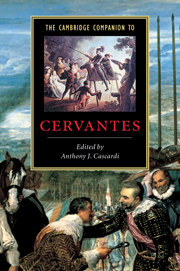Book contents
- Frontmatter
- 1 Introduction
- 2 The historical and social context
- 3 Cervantes and the Italian Renaissance
- 4 Don Quixote and the invention of the novel
- 5 The influence of Cervantes
- 6 Cervantes’ other fiction
- 7 Writings for the stage
- 8 Humor and violence in Cervantes
- 9 Psyche and gender in Cervantes
- 10 Cervantes and the New World
- Appendix: electronic editions and scholarly resources
- Index
- Series List
6 - Cervantes’ other fiction
Published online by Cambridge University Press: 28 May 2006
- Frontmatter
- 1 Introduction
- 2 The historical and social context
- 3 Cervantes and the Italian Renaissance
- 4 Don Quixote and the invention of the novel
- 5 The influence of Cervantes
- 6 Cervantes’ other fiction
- 7 Writings for the stage
- 8 Humor and violence in Cervantes
- 9 Psyche and gender in Cervantes
- 10 Cervantes and the New World
- Appendix: electronic editions and scholarly resources
- Index
- Series List
Summary
Don Quixote’s siblings
In cultures of Fame, other writings of the author of a masterpiece are likely to suffer the same fate as siblings of a prodigy. Classed as unexceptional, for whatever reasons, they languish in the shadows while beams of admiring curiosity are trained on one who has been singled out for special attention. So it has been with the “other” works of Miguel de Cervantes, ever since the History of the Ingenious Hidalgo burst upon the literary scene in 1605, serving as catalyst for a series of developments in imaginative prose that would permanently alter the landscape of world literature. Given Cervantes' identification with the novel, modernity's genre of choice, it is perhaps not surprising that his dramatic and poetic works should be little known outside of specialist scholarly circles. But general recognition of Don Quixote's inventor as a founding master of the art of narrative makes quite conspicuous widespread neglect of his three other works of prose fiction: the pastoral romance Galatea (Los seis libros de la Galatea) (1585), the collection of twelve Exemplary Novels (Novelas ejemplares) (1613), and the posthumous Trials of Persiles and Sigismunda: A Northern Story (Los trabajos de Persiles y Sigismunda: Historia septentrional) (1617). Taken together, these volumes more than double Cervantes' output in prose. Indeed, as scholars have observed, had only these three been left to posterity, the resulting corpus would accord Miguel de Cervantes Saavedra a place of no small importance in the early modern history of European letters.
- Type
- Chapter
- Information
- The Cambridge Companion to Cervantes , pp. 100 - 130Publisher: Cambridge University PressPrint publication year: 2002
- 2
- Cited by



